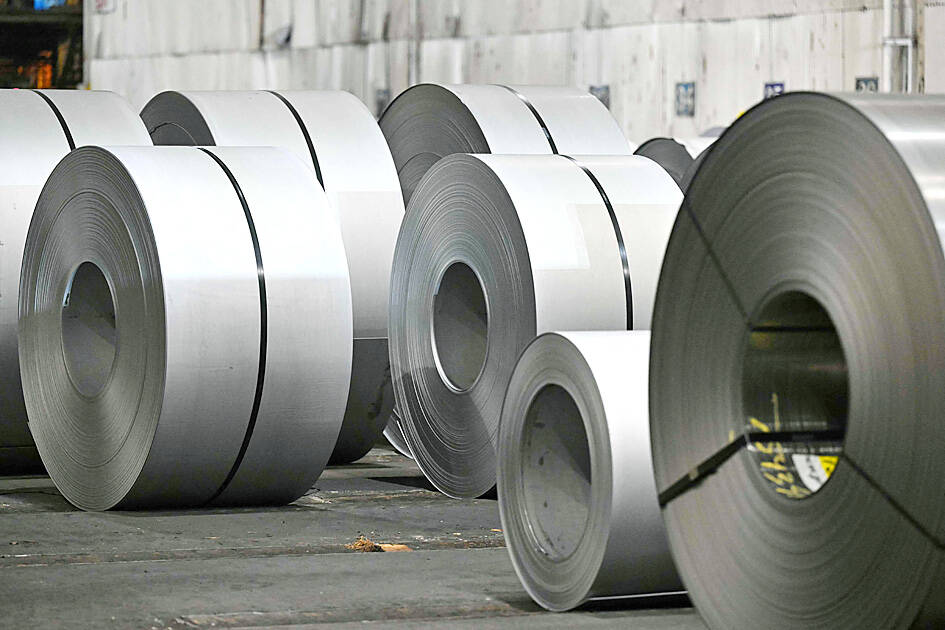China Steel Corp (中鋼), Taiwan’s largest steelmaker, yesterday said that the US President Donald Trump’s announcement last week to double tariffs on imported steel and aluminum to 50 percent would have a limited direct impact on its operations, as the company's exports to the US accounted for just 0.4 percent of Taiwan’s total steel exports to the US last year.
The company shipped about 9,000 tonnes of steel to the US in 2023, significantly less than the 200,000 tonnes it exported to Mexico and Canada combined, China Steel said in a statement.
Trump on Friday told Pennsylvania steelworkers that he would hike tariffs on imported steel and aluminum products to 50 percent from 25 percent starting tomorrow.

Photo: AFP
The tariff hike would weaken the price competitiveness of Taiwanese steel and iron products exported directly to the US, especially those producing single-pass rolling steel, API pipes, fasteners and auto components, China Steel said.
“Since we mainly provide [raw materials] for domestic downstream customers to process and export, if the US tariffs affect their export orders, it might indirectly affect our sales,” China Steel said. “We will maintain close cooperation with clients to develop countermeasures and mitigate the impact.”
Still, “some of our clients need to negotiate with US importers over who will absorb the tariff costs,” a China Steel official told the Taipei Times by telephone, requesting anonymity.
In addition to US tariffs, the company is closely monitoring the rapid appreciation of the New Taiwan dollar against the US dollar and a surge in Chinese steel supply, the official said, adding that it would adjust its sales strategies, market deployment and product portfolio to stabilize its operations.
However, the official said that export-oriented downstream clients would inevitably be affected by the NT dollar’s appreciation.
That was a key factor behind the company’s decision last month to cut domestic steel prices by NT$600 per tonne, the official added.

In Italy’s storied gold-making hubs, jewelers are reworking their designs to trim gold content as they race to blunt the effect of record prices and appeal to shoppers watching their budgets. Gold prices hit a record high on Thursday, surging near US$5,600 an ounce, more than double a year ago as geopolitical concerns and jitters over trade pushed investors toward the safe-haven asset. The rally is putting undue pressure on small artisans as they face mounting demands from customers, including international brands, to produce cheaper items, from signature pieces to wedding rings, according to interviews with four independent jewelers in Italy’s main

Japanese Prime Minister Sanae Takaichi has talked up the benefits of a weaker yen in a campaign speech, adopting a tone at odds with her finance ministry, which has refused to rule out any options to counter excessive foreign exchange volatility. Takaichi later softened her stance, saying she did not have a preference for the yen’s direction. “People say the weak yen is bad right now, but for export industries, it’s a major opportunity,” Takaichi said on Saturday at a rally for Liberal Democratic Party candidate Daishiro Yamagiwa in Kanagawa Prefecture ahead of a snap election on Sunday. “Whether it’s selling food or

CONCERNS: Tech companies investing in AI businesses that purchase their products have raised questions among investors that they are artificially propping up demand Nvidia Corp chief executive officer Jensen Huang (黃仁勳) on Saturday said that the company would be participating in OpenAI’s latest funding round, describing it as potentially “the largest investment we’ve ever made.” “We will invest a great deal of money,” Huang told reporters while visiting Taipei. “I believe in OpenAI. The work that they do is incredible. They’re one of the most consequential companies of our time.” Huang did not say exactly how much Nvidia might contribute, but described the investment as “huge.” “Let Sam announce how much he’s going to raise — it’s for him to decide,” Huang said, referring to OpenAI

The global server market is expected to grow 12.8 percent annually this year, with artificial intelligence (AI) servers projected to account for 16.5 percent, driven by continued investment in AI infrastructure by major cloud service providers (CSPs), market researcher TrendForce Corp (集邦科技) said yesterday. Global AI server shipments this year are expected to increase 28 percent year-on-year to more than 2.7 million units, driven by sustained demand from CSPs and government sovereign cloud projects, TrendForce analyst Frank Kung (龔明德) told the Taipei Times. Demand for GPU-based AI servers, including Nvidia Corp’s GB and Vera Rubin rack systems, is expected to remain high,